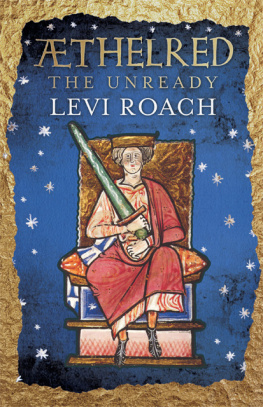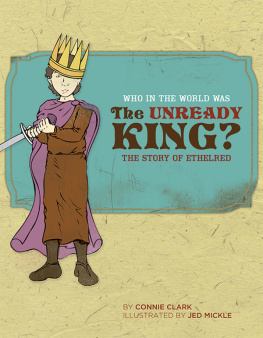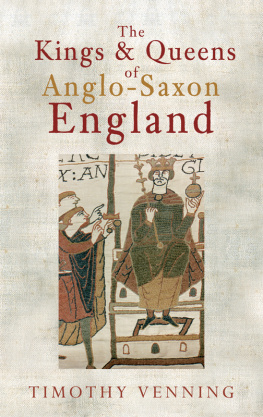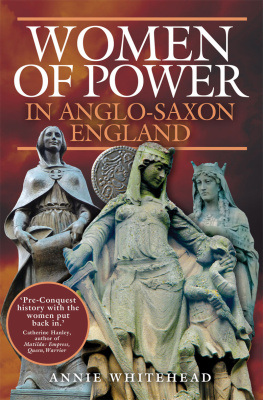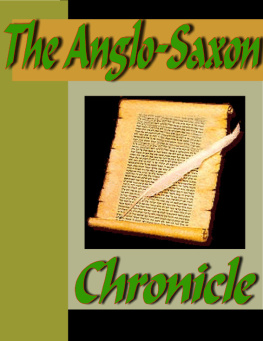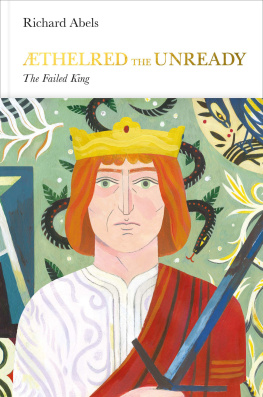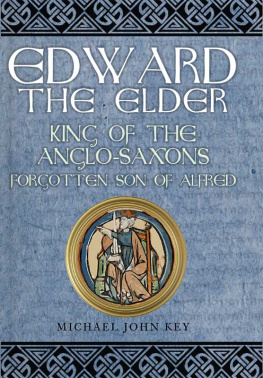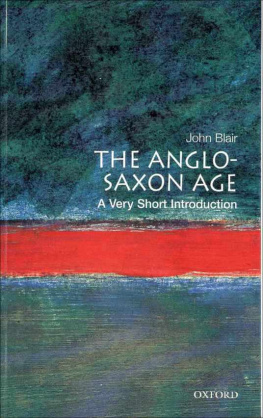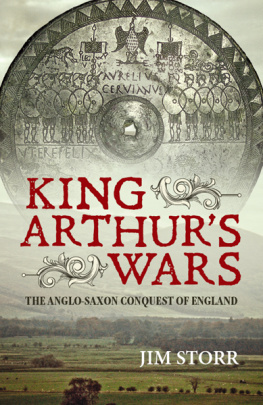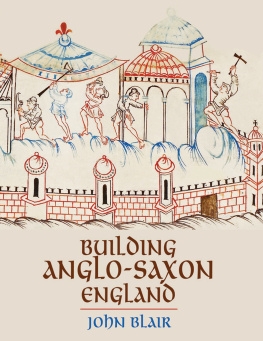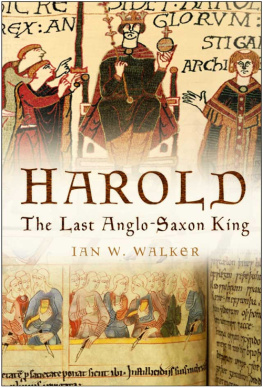King of England Ethelred II - Æthelred the Unready
Here you can read online King of England Ethelred II - Æthelred the Unready full text of the book (entire story) in english for free. Download pdf and epub, get meaning, cover and reviews about this ebook. City: Great Britain, year: 2016, publisher: Yale University Press, genre: Religion. Description of the work, (preface) as well as reviews are available. Best literature library LitArk.com created for fans of good reading and offers a wide selection of genres:
Romance novel
Science fiction
Adventure
Detective
Science
History
Home and family
Prose
Art
Politics
Computer
Non-fiction
Religion
Business
Children
Humor
Choose a favorite category and find really read worthwhile books. Enjoy immersion in the world of imagination, feel the emotions of the characters or learn something new for yourself, make an fascinating discovery.
- Book:Æthelred the Unready
- Author:
- Publisher:Yale University Press
- Genre:
- Year:2016
- City:Great Britain
- Rating:3 / 5
- Favourites:Add to favourites
- Your mark:
- 60
- 1
- 2
- 3
- 4
- 5
Æthelred the Unready: summary, description and annotation
We offer to read an annotation, description, summary or preface (depends on what the author of the book "Æthelred the Unready" wrote himself). If you haven't found the necessary information about the book — write in the comments, we will try to find it.
An imaginative reassessment of thelred the Unready, one of medieval Englands most maligned kings and a major Anglo-Saxon figure
The Anglo-Saxon king thelred the Unready (9781016) has
Æthelred the Unready — read online for free the complete book (whole text) full work
Below is the text of the book, divided by pages. System saving the place of the last page read, allows you to conveniently read the book "Æthelred the Unready" online for free, without having to search again every time where you left off. Put a bookmark, and you can go to the page where you finished reading at any time.
Font size:
Interval:
Bookmark:
THELRED

Copyright 2016 Levi Roach
All rights reserved. This book may not be reproduced in whole or in part, in any form (beyond that copying permitted by Sections 107 and 108 of the U.S. Copyright Law and except by reviewers for the public press) without written permission from the publishers.
For information about this and other Yale University Press publications, please contact:
U.S. Office:
Europe Office:
Typeset in Adobe Garamond Pro by IDSUK (DataConnection) Ltd
Printed in Great Britain by TJ International Ltd, Padstow, Cornwall
Library of Congress Cataloging-in-Publication Data
Names: Roach, Levi, 1985- author.
Title: thelred the unready / Levi Roach.
Other titles: Ethelred the Unready
Description: New Haven : Yale University Press, [2016]
Identifiers: LCCN 2016019938 | ISBN 9780300196290 (alk. paper) Subjects: LCSH: Ethelred II, King of England, 968?-1016. | Great BritainHistoryEthelred II, 979-1016. | Great BritainKings and rulersBiography.
Classification: LCC DA154.7 .R63 2016 | DDC 942.01/74092 [B]dc23
LC record available at https://lccn.loc.gov/2016019938
A catalogue record for this book is available from the British Library.
10 9 8 7 6 5 4 3 2 1
CONTENTS
PLATES, MAPS AND FIGURES
Plates
Maps
After M. Lapidge et al., ed., Wiley Blackwell Encyclopedia of Anglo-Saxon England (Chichester, 2013), p. 572.
After C. Wickham, The Inheritance of Rome: A History of Europe from 400 to 1000 (London, 2009), p. xviii.
After D. Hill, An Atlas of Anglo-Saxon England (Oxford, 1981), p. 68.
After Hill, Atlas, p. 69.
Figures
A NOTE ON NAME FORMS AND REFERENCES
A s those who have read any amount of scholarship on Anglo-Saxon England will be aware, early English personal names can be modernized in a variety of fashions. The attempt here has been to conform to standard scholarly practice at present. Thus, the Old English vowel (pronounced as a sharp a, rather like that in cat or hat) is kept, but and are replaced by their modern equivalent th and by w. The attempt has otherwise been to keep as close as possible to the original (thus, thelstan not Athelstan, Eadwig not Edwy, etc.); however, where there are good modern equivalents of the name in question, these have been preferred (e.g. Alfred not lfred, Edgar not Eadgar). With non-English names the approach has been less systematic and more impressionistic. Here I generally follow the forms used in the Wiley Blackwell Encyclopedia of Anglo-Saxon England (Swein rather than Swegen or Sveinn, Olaf rather than Olav or Olfr); otherwise, I seek to render them in the form best known to Anglophone students and scholars. Doubtless many inconsistencies remain, but hopefully it will be clear enough who is intended. When rulers are first mentioned in the main text, their reigns are given in parentheses; likewise, the episcopates and abbacies of important prelates are often given when they are first encountered.
My approach to referencing has been similarly pragmatic: I have attempted to cite all the most recent and relevant secondary literature, without seeking to be exhaustive. In order to avoid overburdening an already long text, articles are cited from their most recent place of appearance (or at least the most recent one known to me), except when this is in a rare or hard-to-find volume. Likewise, citations of sources are to the most recent edition; guidance on other editions and translations (if available) can generally be found there. Readers wishing to delve more fully into the sources of the period are pointed in the first instance towards Dorothy Whitelocks invaluable English Historical Documents. When sources are first mentioned, their date of composition is given (if known). For these purposes I follow standard scholarly convention in using to designate an unknown point during a span and to designate the span itself: 997 1002 thus means written/completed at some point between 997 and 1002, whereas 9971002 would mean written continuously between 997 and 1002.
ACKNOWLEDGEMENTS
T his book has been a long time in the planning, but a short time in the writing. That this should be so is thanks in no small measure to the help and support of many friends and colleagues. On the Exeter end of things, the Department of History and broader community of medievalists have made the last three years of writing and research immensely enjoyable. A timely spell of research leave in the first half of 2015 facilitated the drafting of the main text. I am particularly grateful to Sarah Hamilton, who made time out of her busy schedule to discuss aspects of tenth- and eleventh-century European history, and Helen Birkett, whose office has been a welcome sanctuary during the storm of term. Thanks also go to the first group of students on my thelred Special Subject; their interest and enthusiasm for all things thelredian helped sustain me through the final stages of revision. Friends and colleagues elsewhere in the UK and beyond have likewise been a source of sage counsel and constructive criticism. I am especially beholden to Charlie Insley, Emily Ward, Andrew Rabin, Alban Gautier, Eric Denton, Courtney Konshuh and Hendrik Mkeler, who have shared thoughts, work-in-progress and copies of hard-to-find publications. An even greater debt is owed to those kind souls who read through the book (or sections thereof) in draft form: Megan Welton, who went through matters monastic; and Rory Naismith, who read the entire manuscript, making many helpful suggestions, particularly regarding the treatment of coinage. Similar thanks are owed to the Presss two anonymous readers, whose comments and criticisms greatly improved the text. On a more personal note, it would not have been possible to write this book without the support and encouragement of many good friends both within and beyond the academy; in the place of many, I should like to thank Matthias Ammon, Ronni Phillips, Erik Niblaeus, Danica Summerlin and Johanna Dale.
The staff at the London office of Yale University Press have been a model of professionalism and efficiency throughout. I am particularly grateful to Heather McCallum, who was willing to entrust such a major project to a young and relatively untested scholar, and to Rachael Lonsdale and Melissa Bond (and their team), who saw the text through production. I have also been fortunate to receive a great deal of help from within the family. As ever, my parents and their spouses have been a source of much-needed support, encouragement and distraction along the way. Likewise, my in-laws have repeatedly opened their doors to me on holidays and research trips to London; it is no exaggeration to say that Hampton has come to feel like a second home. My wife, Cathy, has inevitably borne the greatest burden of all: throughout our married life she has had to share my time with thelred (the third person in our relationship, as it must have felt); that she has done so with such equanimity is a credit to her love, patience and care. Last, but certainly not least, I owe an immeasurable debt both personal and intellectual to Simon Keynes. It was his teaching which first inspired me to become a medieval historian (and steered me towards the subject of thelred) and his scholarly example continues to guide my work. I dedicate this book to him.
Levi Roach
University of Exeter
St Georges Day, 2016
ABBREVIATIONS AND SHORT TITLES
General abbreviations
lfric, CH: FS | lfric of Eynsham, Catholic Homilies: The First Series, ed. P. Clemoes, EETS s.s. 17 (Oxford, 1997) |
Font size:
Interval:
Bookmark:
Similar books «Æthelred the Unready»
Look at similar books to Æthelred the Unready. We have selected literature similar in name and meaning in the hope of providing readers with more options to find new, interesting, not yet read works.
Discussion, reviews of the book Æthelred the Unready and just readers' own opinions. Leave your comments, write what you think about the work, its meaning or the main characters. Specify what exactly you liked and what you didn't like, and why you think so.

